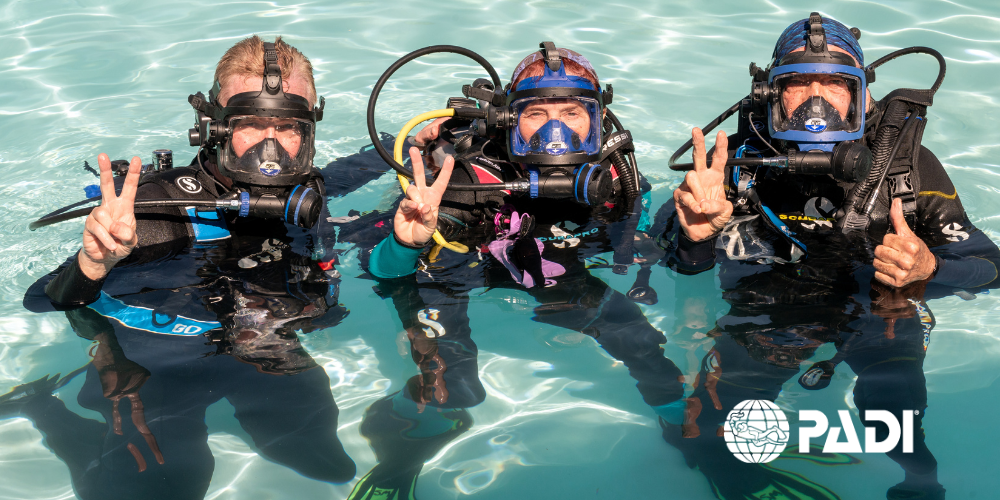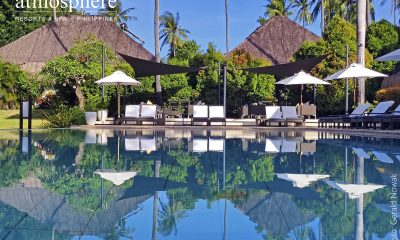Marine Life & Conservation
OceanShot invites PADI to first-ever underwater panel

PADI Pros train with OceanShot partners for underwater coral reef panel at the Global Citizen Forum at COP28
PADI®. is joining OceanShot co-founders for the historic underwater panel on positive ocean change at the Global Citizen Forum, which is taking place alongside COP28 in Ras Al Khaimah, UAE December 6-7 2023. The first-of-its-kind underwater panel will dive deep into the importance of coral reef protection to elevate the urgent need for ocean action.
PADI’s CEO and President, Drew Richardson will join Dr. Brosnan and Mr. DeJoria at the Global Citizen Forum’s first-ever underwater panel to purposefully descend beneath the surface in the hopes of calling people around the globe to positive ocean action and inspiring them to both explore and save the ocean.
OceanShot is a coral reef ecosystem restoration project co-founded by globally-recognised marine scientist and climate risk expert Dr. Deborah Brosnan, and global philanthropist, environmentalist and entrepreneur John Paul DeJoria, launched in partnership with the Government of Antigua and Barbuda. The initiative uses technology that mimics the design and shape of natural reefs to restore coral and invite back marine life, as well as protect nearby coastal communities from storm surge and sea level rise.
Dr. Richardson is one of the most influential people in scuba diving and has transformed PADI’s mission to create a billion ocean TorchbearersTM. who are taking local action for global impact and united by a shared vision to achieve balance between humanity and the ocean.
OceanShot’s first living-lab hub, designed to be a place where innovators can test their technologies aimed at environmental protection, was deployed in Antigua and Barbuda. In June 2021, the Global Citizen Forum adopted OceanShot as one of its supported flagship initiatives. This year, OceanShot’s co-founders invited PADI as a partner in its world-class restoration model.
“Coral reefs are among the most ecologically and economically valuable ecosystems that drive our blue economy,” says Dr. Richardson. “Scuba divers can explore beneath the surface and fuel ocean change as Torchbearers, taking part in a range of meaningful diver citizen-science actions driving real results. And as global citizens, we have the opportunity to be changemakers that inspire more innovative and positive solutions for the health of coral reefs, the ocean and our shared blue planet.”
“We’re doing this work because our oceans need us and we need them,” says Dr. Brosnan. “Humans have mapped the human genome, landed astronauts on the moon, and in less than twelve months developed a viable vaccine to combat a global pandemic. It is time to focus the same attention on our oceans with bold, ambitious, and achievable initiatives.”
PADI recently conducted a special underwater training session with Dr. Richardson, Dr. Brosnan and Mr. DeJoria in preparation for the upcoming underwater panel in December where they will share their knowledge and passion for ocean conservation with the world.
To learn more about the first underwater panel at the Global Citizen Forum visit globalcitizenforum.org/ocean-shot/.
OceanShot is managed and operated by Dr. Deborah Brosnan. For more information, visit https://www.deborahbrosnan.com/oceanshot.html
About PADI
PADI® (Professional Association of Diving Instructors®) is the largest purpose-driven diving organization with a global network of 6,600 dive centers and resorts, 128,000 professional members and more than 29 million certified divers to date. Committed to our blue planet, PADI makes the wonder of the underwater world accessible to all, empowering people around the world to experience, explore and take meaningful action, as Ocean Torchbearers, to protect the world beneath the surface. For over 50 years, PADI is undeniably The Way the World Learns to Dive®, setting the standard for the highest quality dive training, underwater safety and conservation initiatives while evolving the sport of diving into a passionate lifestyle. For divers by divers, PADI is obsessed with transforming lives and, with its global foundation, PADI AWARE, creating positive ocean change. Seek Adventure. Save the Ocean.
Marine Life & Conservation
Double Bubble for Basking Sharks

 The Shark Trust is excited to announce that, for two more days only, all donations, large or small, will be doubled in the Big Give Green Match Fund!
The Shark Trust is excited to announce that, for two more days only, all donations, large or small, will be doubled in the Big Give Green Match Fund!
Donate to Basking in Nature: Sighting Giants
The Shark Trust is hoping to raise £10k which will be doubled to £20k. This will go towards Basking in Nature: Sighting Giants. And they need YOUR help to reach they’re goal.
The Shark Trust’s citizen science project is to monitor and assess basking sharks through sightings; encouraging data collection, community engagement, and promoting nature accessibility. This initiative aims to enhance health and wellbeing by fostering a deeper connection with British Sharks.
Campaign Aims
- Increase citizen science reporting of Basking Sharks and other shark sightings to help inform shark and ray conservation.
- Provide educational talks about the diverse range of sharks and rays in British waters and accessible identification guides!
- Create engaging and fun information panels on how to ID the amazing sharks and rays we have on our doorstep! These can be used on coastal paths around the Southwest. With activities and information on how you can make a difference for sharks and rays!
- Promote mental wellbeing through increasing time in nature and discovering the wonders beneath the waves!
Donate, and double your impact. Click Here
Marine Life & Conservation
Leading UK-based shark conservation charity, the Shark Trust, is delighted to announce tour operator Diverse Travel as a Corporate Patron

 Corporate Patrons provide a valuable boost to the work of The Shark Trust. The Trust team works globally to safeguard the future of sharks, and their close cousins, the skates and rays, engaging with a global network of scientists, policymakers, conservation professionals, businesses and supporters to further shark conservation.
Corporate Patrons provide a valuable boost to the work of The Shark Trust. The Trust team works globally to safeguard the future of sharks, and their close cousins, the skates and rays, engaging with a global network of scientists, policymakers, conservation professionals, businesses and supporters to further shark conservation.
Specialist tour operator Diverse Travel has operated since 2014 and is committed to offering its guests high quality, sustainable scuba diving holidays worldwide. Working together with the Shark Trust will enable both organisations to widen engagement and encourage divers and snorkellers to actively get involved in shark conservation.
“Sharks are truly at the heart of every diver and at Diverse Travel, we absolutely share that passion. There is nothing like seeing a shark in the wild – it’s a moment that stays with you forever!” says Holly Bredin, Sales & Marketing Manager, Diverse Travel.
“We’re delighted to celebrate our 10th year of business by becoming a Corporate Patron of the Shark Trust. This is an exciting partnership for Diverse and our guests. We will be donating on behalf of every person who books a holiday with us to contribute towards their vital shark conservation initiatives around the world. We will also be working together with the Trust to inspire divers, snorkellers and other travellers to take an active role – at home and abroad – in citizen science projects and other activities.”
Paul Cox, CEO of The Shark Trust, said:
“It’s an exciting partnership and we’re thrilled to be working with Diverse Travel to enable more divers and travellers to get involved with sharks and shark conservation. Sharks face considerable conservation challenges but, through collaboration and collective action, we can secure a brighter future for sharks and their ocean home. This new partnership takes us one more valuable step towards that goal.”
For more information about the Shark Trust visit their website here.
For more about Diverse Travel click here.
-

 News3 months ago
News3 months agoHone your underwater photography skills with Alphamarine Photography at Red Sea Diving Safari in March
-

 News3 months ago
News3 months agoCapturing Critters in Lembeh Underwater Photography Workshop 2024: Event Roundup
-

 Marine Life & Conservation Blogs3 months ago
Marine Life & Conservation Blogs3 months agoCreature Feature: Swell Sharks
-

 Blogs2 months ago
Blogs2 months agoMurex Resorts: Passport to Paradise!
-

 Blogs2 months ago
Blogs2 months agoDiver Discovering Whale Skeletons Beneath Ice Judged World’s Best Underwater Photograph
-

 Gear Reviews2 weeks ago
Gear Reviews2 weeks agoGEAR REVIEW – Revolutionising Diving Comfort: The Sharkskin T2 Chillproof Suit
-

 Marine Life & Conservation2 months ago
Marine Life & Conservation2 months agoSave the Manatee Club launches brand new webcams at Silver Springs State Park, Florida
-

 Gear Reviews3 months ago
Gear Reviews3 months agoGear Review: Oceanic+ Dive Housing for iPhone


















